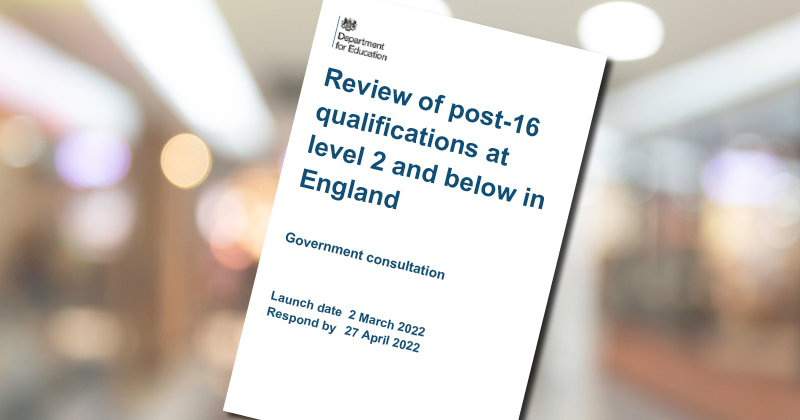The review seems unaware of the sell-by dates of its proposals – and that’s only the beginning, writes Gordon Marsden
As a founder member of the Right to Learn group, which advocates for a statutory right to learn throughout life, I was struck by a number of issues as I ploughed my way through the Department for Education’s level 2 and below qualifications review.
I noticed how little was said in the 90-plus pages about unintended consequences, and the concerns of many in FE that in a rapidly changing world, doors should not be closed.
There was also little mention of what credibility this review might have with employers, wearied by a decade of government “initiatives”.
For example, the review says: “In future, all technical provision including work-based study, such as apprenticeships and classroom-based study, will fit within a single framework built from employer-led occupational standards.”
Easy to say but difficult to do.
Previous ministerial attempts to implement the 2012 Richard review, which called for employer-led apprenticeships qualifications, have been dogged by delay, poor definition and exasperation by employers.
This review also shows scant recognition of the possible “sell-by” dates of these proposals, given the unprecedented transformation across multiple sectors and skillsets in the next decade.

Nor does it pay attention to the huge increase in people who will be self-employed, sole traders and working in co-operatives, which the 2018 Taylor report on the future of work spelled out.
Getting the pipeline right for would-be learners to progress into level 2 and beyond is critical. They need a direction of travel in qualifications that are flexible, not micromanaged by Whitehall.
So while observing that “some adults may struggle to access larger qualifications”, the review proposes qualifications that “focus on the essential knowledge, skills and behaviour for that occupation… They will not include the breadth of route-wide content or transferable skills that are included in the larger qualification”.
So learners risk being stuck in the slow lane on narrow qualifications, with the ghost of Mr Gradgrind in the wings (the cold-hearted school leader created by Charles Dickens who sees people only as machines). It could also mean they only access jobs likely to become obsolete.
Learners risk being stuck in the slow lane
The review talks positively about funding progression for young people in “pre-technical groups”. But the example given is hideously complex: “An entry level 3 qualification providing for an introduction to hospitality and catering will lead directly on to a level 1 hospitality and catering, which in turn will support progression to a related level 2 qualification in hospitality and catering or professional cookery.”
The questions pile up. How long will this take? What might the potential drop-out rate be? How might employers, particularly smaller businesses, respond to such a tortuous process?
Proposals for qualifications supporting cross-sectoral skills are welcome. But restricting them for 16- to 19-year-olds ignores those needing a second chance in the 19-to-24 age range and beyond.
Meanwhile, a large number of older people have exited the workforce since the pandemic, research from the Learning and Work Institute has found. A bonfire of entry-level qualifications could exacerbate that exodus.
Another danger is that proposals to link classroom-based qualifications with apprenticeships risk repeating the sorry history of the past decade and the apprenticeship levy, where we have seen big problems with recruitment and retention.
In early March, FE Week ran a front cover stating “1000s of level 2 and below qualifications face the chop”. The story said 72 per cent of level 2 qualifications for 16-to-19-year-olds, and 61 per cent for adults, could go.
But in 2018/19, 21 per cent of 16-year-olds were studying at level 2 and below. Meanwhile, 57 per cent of ESFA funding went to adults at level 2 and below.
Then in edition 386, Adrian Grove of Qube Learning said small qualifications “hold the greatest power as stepping stones” for those who have struggled with education.
So how many of the roughly 800,000 young people in the NEET category will be levelling up to T Levels, given this review’s diminution of pathways?
If DfE goes ahead with this present review, they risk undermining the very outcomes the ‘levelling up’ agenda is designed to facilitate.









Your thoughts